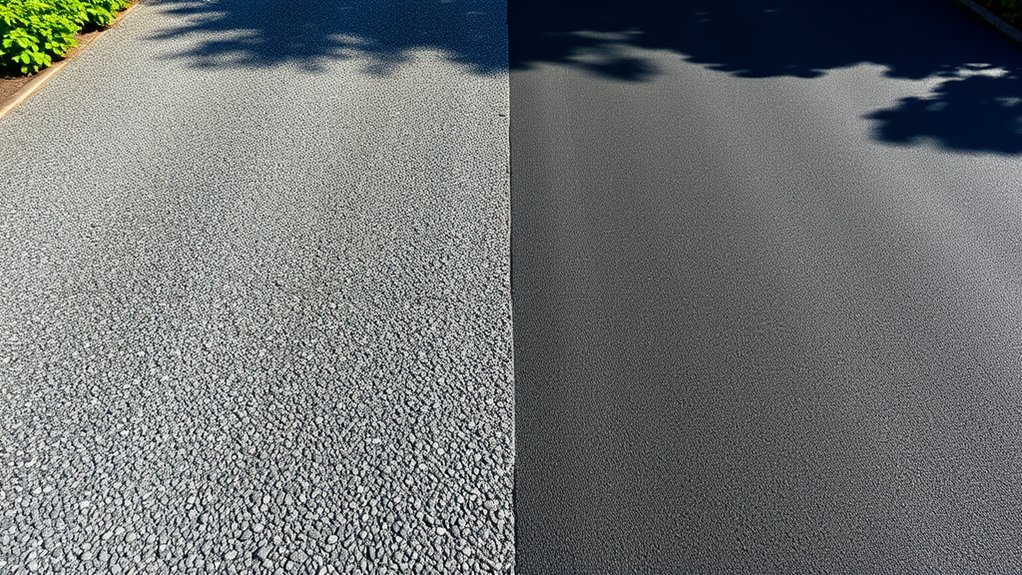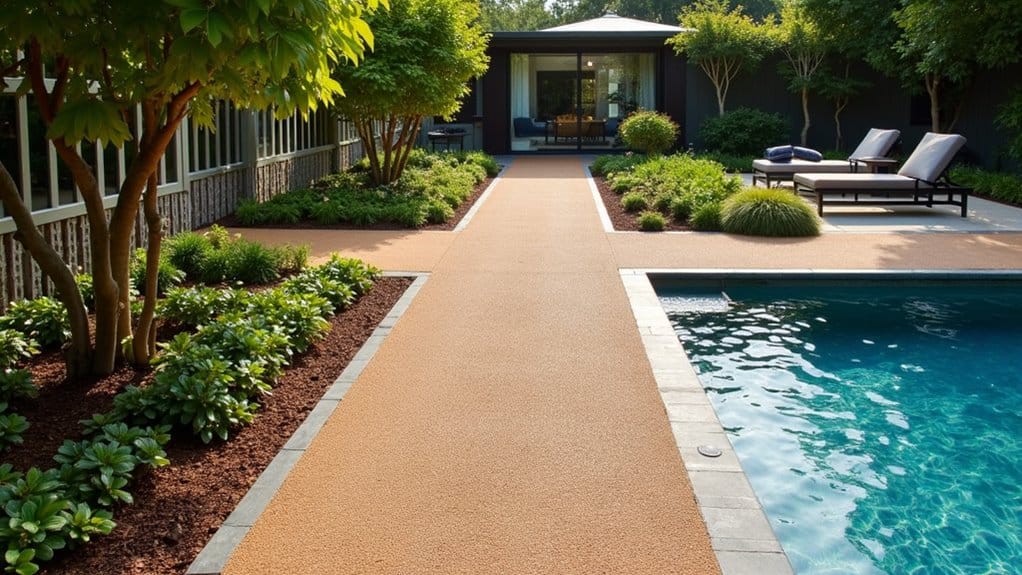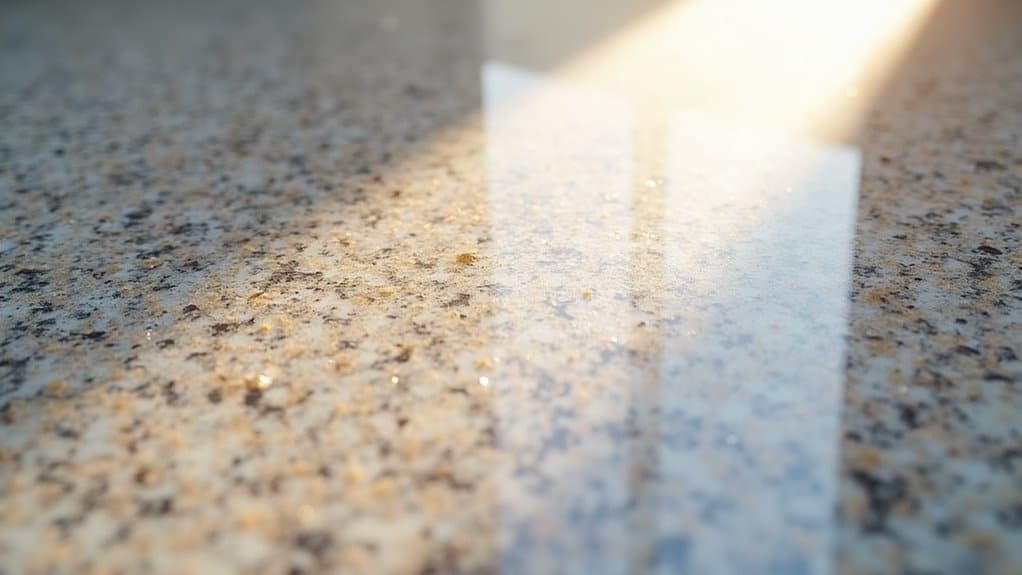Tarmac and asphalt driveways are different in both composition and performance. Tarmac is made with tar and has a rougher texture, whereas asphalt uses bitumen, which provides better strength and flexibility. Asphalt offers a smoother surface, retains its dark colour, and generally lasts longer with less maintenance. Although tarmac cures quickly, it can deteriorate in harsh weather conditions. Knowing these differences can help you decide which option suits your needs best. For more details on installation and environmental factors, further research is recommended.
Table of Contents
ToggleKey Takeaways
- Asphalt is made with bitumen, giving it strength and flexibility, while tarmac uses tar and features larger aggregates.
- Tarmac sets quickly and is usually cheaper to install than asphalt, which takes longer to cure.
- Asphalt typically lasts longer and requires less maintenance, whereas tarmac can deteriorate faster in extreme weather.
- Asphalt is highly recyclable and has lower carbon emissions, while tarmac relies more on fossil fuels, leading to a bigger carbon footprint.
- Asphalt provides a smooth, uniform finish, while tarmac has a rougher texture, allowing for more design options and bold edging.
Composition and Materials
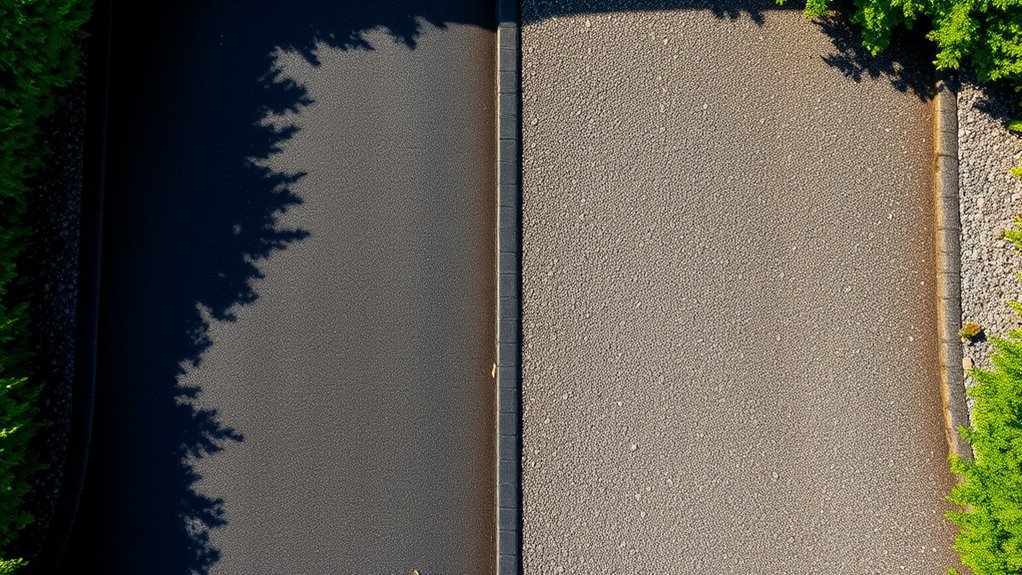
When choosing between tarmac and asphalt driveways, it's important to know their differences in composition and materials.
Asphalt uses bitumen, a binder from petroleum, while tarmac uses tar. This distinction affects their strength and flexibility—bitumen makes asphalt more durable in various conditions, whereas tar is more susceptible to spills and damage.
The size of aggregates also differs; tarmac generally has larger aggregates compared to the smaller particles found in asphalt. This results in asphalt having a smoother surface, which can improve tyre grip. Additionally, asphalt's durability makes it a preferred option for heavy traffic areas.
Both materials have seen advancements over the years, but asphalt's ability to incorporate additives enhances its performance, making it a popular choice for many applications.
Understanding these differences can help you make an informed decision for your driveway.
Installation and Curing Process
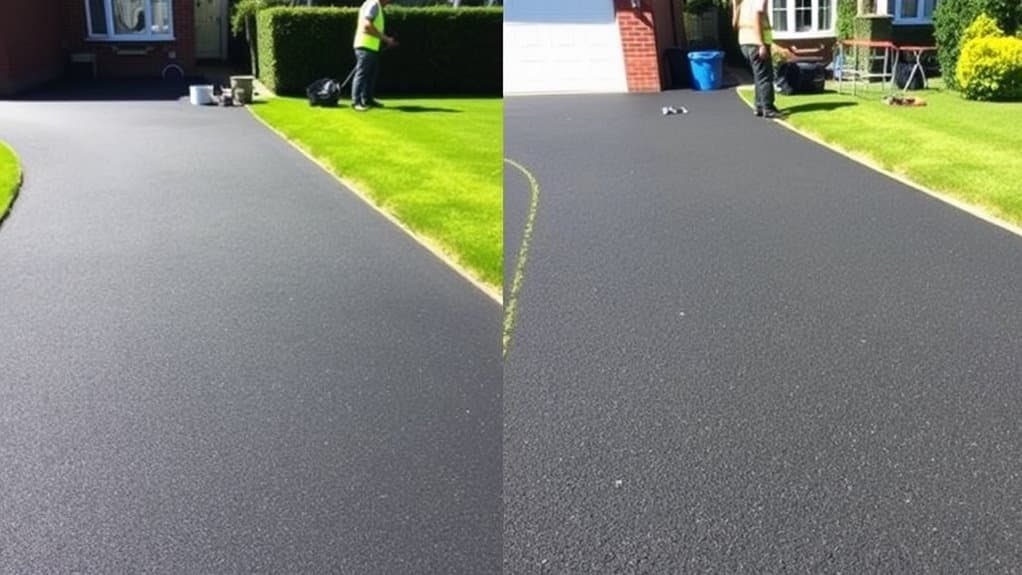
When looking at installation methods for tarmac and asphalt driveways, you'll find key differences in the processes and materials involved. It's important to note that tarmac generally cures much quicker than asphalt. This can influence your project timeline and your satisfaction with the end result. For instance, if you need to use your driveway soon after installation, tarmac may be the better choice. Additionally, tarmac is often chosen for its cost-efficient installation process, making it a popular option among property owners.
Installation Methods Comparison
Both tarmac and asphalt driveways undergo similar installation processes, but there are key differences in their application methods and curing times that can impact their performance and lifespan.
Tarmac installation starts with a thorough assessment of the area, followed by excavation to create a solid sub-base. This involves clearing debris, installing drainage systems, and compacting the base for stability. A firm sub-base installation is essential for driveway longevity.
When it comes to layer application, tarmac generally requires a thicker binder course, whereas asphalt allows for a more flexible approach.
Paying careful attention to these installation methods is crucial for ensuring durability. Poor preparation can lead to issues such as subsidence or drainage problems down the line.
Curing Times Explained
Understanding curing times is essential for the longevity and performance of your driveway, especially when comparing tarmac and asphalt. Tarmac typically dries within 24 to 48 hours but requires 3 to 5 days to fully cure under optimal conditions. Conversely, asphalt can be used after 2 to 3 days but takes about a year to completely cure.
| Material | Curing Duration |
|---|---|
| Tarmac | 3-5 days (fully cured) |
| Asphalt | 1 year (fully cured) |
| Tarmac | 24-48 hours (surface dry) |
| Asphalt | 2-3 days (surface dry) |
Curing conditions are crucial; warmer temperatures and suitable humidity can speed up the process, whereas colder climates may extend it.
Performance and Maintenance
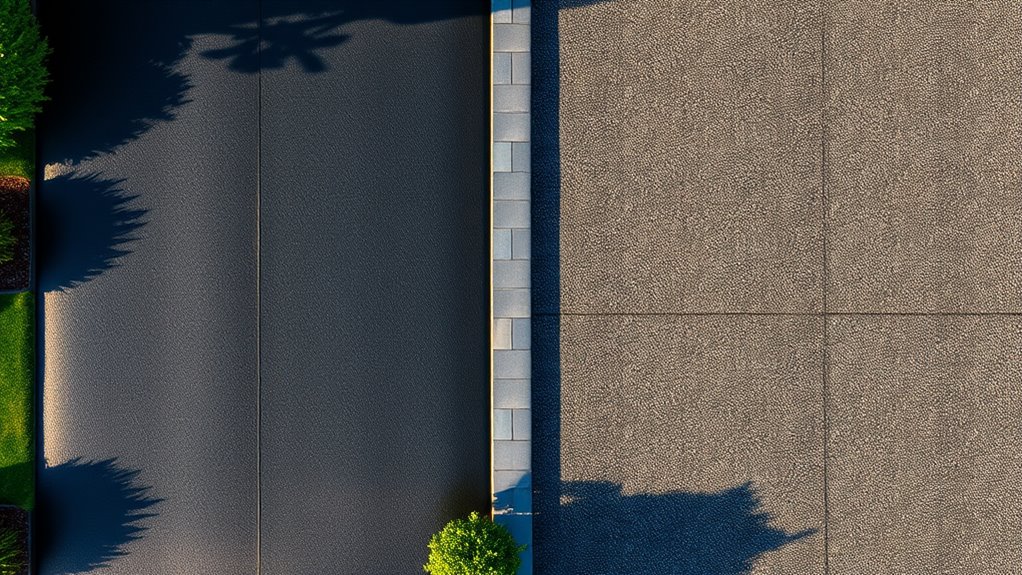
When it comes to driveways, both tarmac and asphalt perform well in various weather conditions, but their maintenance needs differ significantly.
Asphalt driveways tend to last longer and require less frequent upkeep, making them a more durable choice.
Here are some key points to consider:
- Asphalt is more flexible, reducing the chances of cracking.
- Tarmac can wear out more quickly in harsh weather.
- Repairs to asphalt are generally easier and less expensive.
- Tarmac is more vulnerable to spills, which can damage the surface.
- Asphalt provides a smoother finish, improving tyre grip and safety.
Cost and Budget Considerations
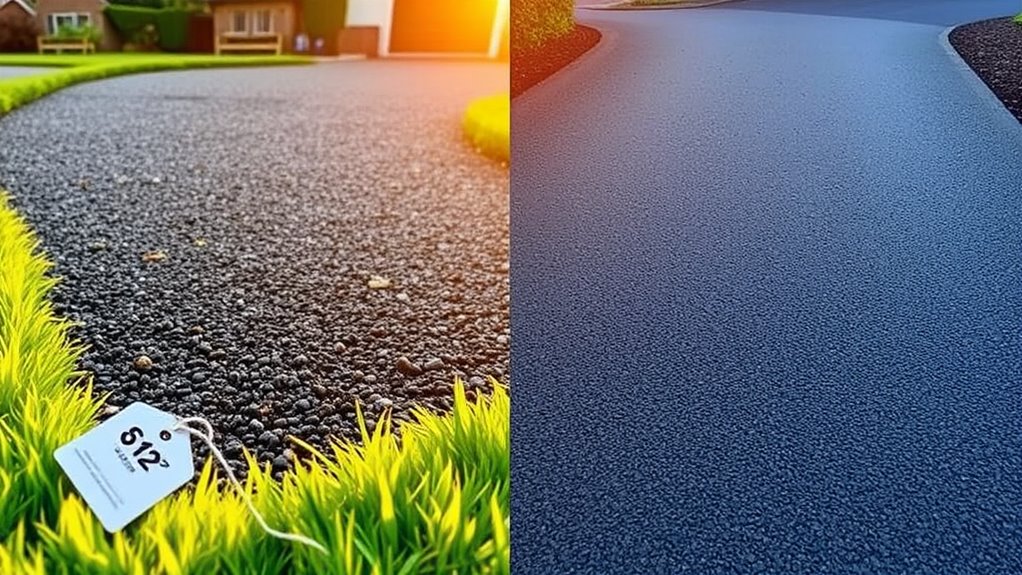
When budgeting for a driveway, consider both initial costs and ongoing expenses.
Here's a quick breakdown: asphalt typically costs between £20 and £100 per square metre, while tarmac tends to be pricier due to higher material and construction costs. Labour for asphalt installation adds another £40 to £60 per square metre.
It's important to factor in regional price differences and the size of the project, as larger driveways can significantly increase costs.
Maintenance is also key; asphalt usually requires less upkeep than tarmac, which can influence your budget in the long run.
If you're thinking about customisation or additional services, be ready for these costs to further impact your overall budget.
Environmental and Sustainability Aspects
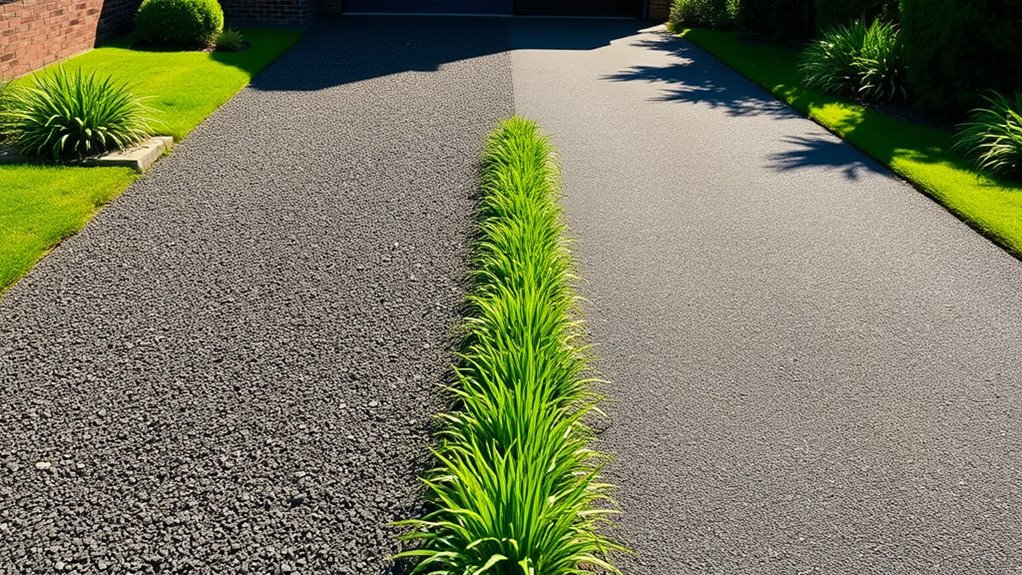
When considering the environmental and sustainability aspects of driveways, recyclability is crucial.
Asphalt has excellent recyclability, helping to reduce waste and conserve resources. In contrast, tarmac has fewer recycling options, which can lead to more waste in landfills.
It's also important to assess the sustainability of the materials used and the methods of production, as these factors contribute significantly to their long-term environmental impact.
Recyclability of Materials
Asphalt driveways have a clear advantage over tarmac due to their recyclability, making them a more sustainable choice.
Here are some key benefits of asphalt:
- Reduces landfill waste, preserving significant land.
- Conserves natural resources by reusing materials.
- Requires less energy, resulting in lower carbon emissions.
- Utilises various waste materials, supporting a circular economy.
- Offers considerable cost savings—up to £80 per tonne.
On the other hand, tarmac can't be recycled, which impacts its eco-friendliness and contributes to environmental harm.
Sustainability Considerations
When considering sustainability, it's important to understand the differences in environmental impact between tarmac and asphalt driveways. Tarmac, which relies heavily on fossil fuels, has a higher carbon footprint. In contrast, asphalt benefits from eco-friendly innovations, such as warmer mixes and biogenic alternatives, which contribute to more sustainable sourcing and lower emissions.
| Aspect | Tarmac |
|---|---|
| Carbon Footprint | Higher |
| Material Composition | Tar and aggregates |
| Emission Levels | Greater |
Asphalt often uses locally sourced materials and incorporates recycled components, making it a more sustainable option. Choosing asphalt not only supports eco-friendly practices but also aligns with ongoing innovations in the industry.
Usage and Applications
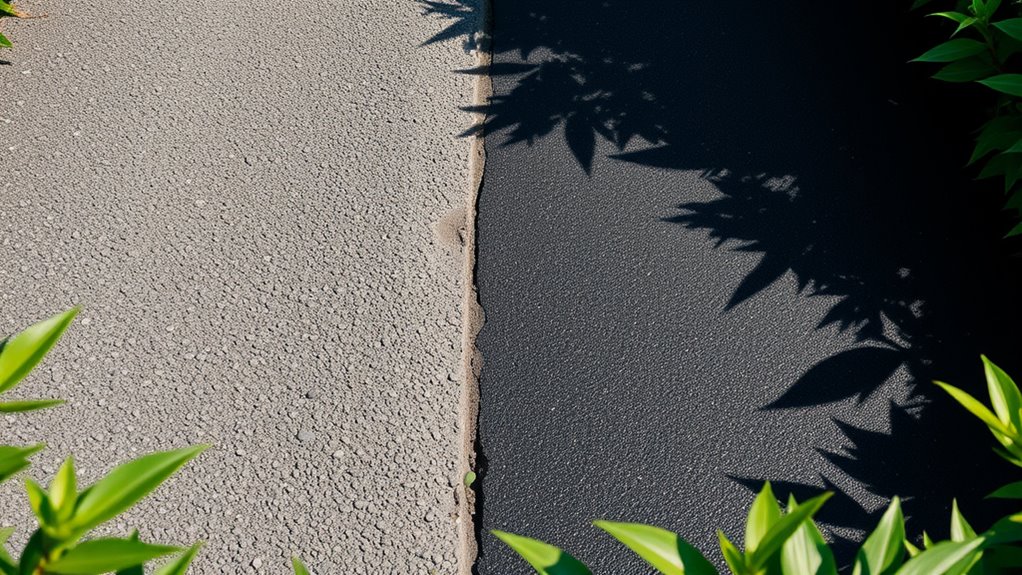
Understanding the differences between tarmac and asphalt is crucial for choosing the right paving material. Each has its own advantages that can affect the longevity and durability of surfaces.
- Tarmac is quick to install and ideal for heavy-duty applications, such as airport runways.
- Asphalt provides a smooth finish, making it a popular choice for residential driveways, with lower long-term maintenance costs.
- Parking lots benefit from asphalt's cost-effectiveness and straightforward upkeep.
- Tarmac can be laid directly onto existing surfaces, making installation simpler.
- While both materials are suitable for general paving, asphalt's reusability offers an eco-friendly benefit.
Aesthetic Considerations
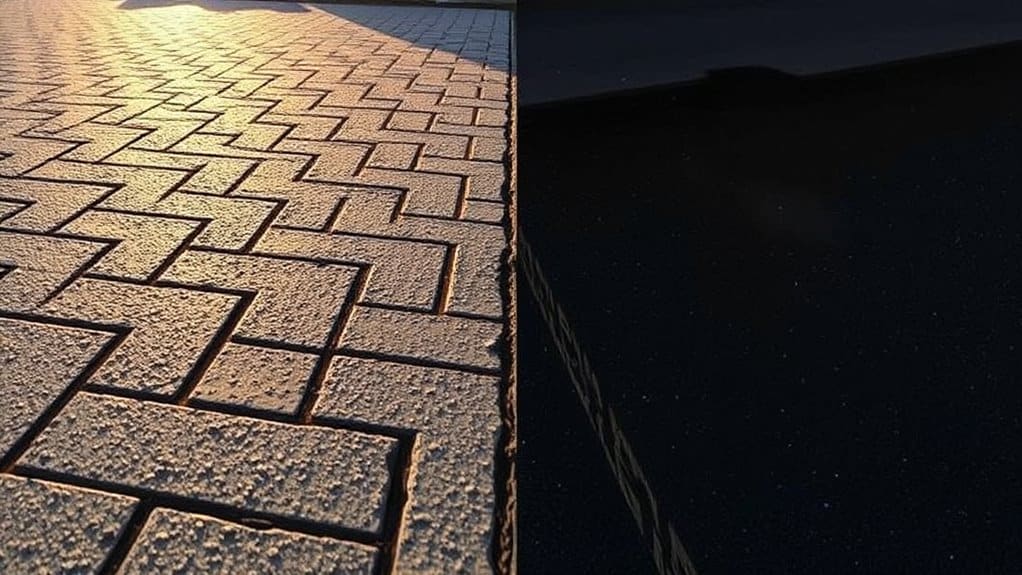
How do aesthetic considerations affect your choice between tarmac and asphalt driveways?
When comparing these materials, think about their surface appearance and texture. Tarmac typically has a rougher texture, allowing for mixed materials and patterns that align with modern design trends. It can showcase subtle colour variations, adding to its visual appeal.
On the other hand, asphalt offers a smoother, more uniform finish and retains its dark colour over time, which is often preferred for a consistent look. While tarmac can incorporate bold edging and contemporary designs, asphalt's straightforward appearance may suit those who favour simplicity.
Ultimately, your choice depends on whether you prioritise versatility and texture or a clean, uniform aesthetic for your driveway.
Choosing the Right Option for Your Driveway

When choosing the right option for your driveway, consider factors like cost, durability, and how well it meets your specific needs.
Don't forget to think about the appearance of your driveway and how seasonal changes might affect your choice.
- Budget will likely influence your material selection.
- Durability is important for long-term value and maintenance.
- Weather resistance ensures the driveway lasts and performs well.
- Traffic levels determine how quickly the surface wears and how often repairs are needed.
- Environmental impact may steer you towards more eco-friendly options.
Asphalt is often a strong choice for high-traffic areas due to its durability and longevity.
On the other hand, tarmac might be better for low-traffic regions or if you need a quicker installation.
Ultimately, your decision should reflect your specific requirements and personal preferences.
Frequently Asked Questions
How Do Weather Conditions Affect Tarmac and Asphalt Driveways?
Weather conditions have a significant effect on the performance of your driveway. In hot weather, asphalt can become soft, while tarmac may also lose some of its strength. Conversely, cold temperatures can cause both materials to contract, which can lead to cracks and a decrease in their ability to withstand the elements. For instance, a scorching summer can make your asphalt driveway feel sticky, while a harsh winter may result in visible damage. Keeping an eye on the weather can help you maintain your driveway's condition.
Which Material Is Easier to Remove or Replace?
Removing asphalt is as easy as peeling a banana—it's straightforward and cost-effective. The removal process is simple, and repairs won't break the bank. In contrast, tarmac involves a more complex and costly removal and replacement process.
Can I Install Tarmac or Asphalt Myself?
You can attempt a DIY installation of tarmac or asphalt, but it's wise to weigh the costs. Both processes demand specific skills and equipment. For instance, if you're not familiar with the proper techniques, you may end up with a surface that cracks or doesn't set properly, leading to expensive repairs later. Consider your experience and the potential expenses before diving in to ensure a successful project.
How Long Can I Expect My Driveway to Last?
You might believe your driveway's lifespan is fixed, but that's not the case. Regular maintenance is crucial; neglecting it can significantly shorten its life. Expect tarmac to last around 12 to 13 years, while asphalt can last between 20 to 30 years, depending on care and usage.
What Are the Common Misconceptions About Tarmac and Asphalt?
It's a common belief that tarmac is less durable than asphalt and that asphalt requires constant upkeep. However, both materials have their own strengths and can be low-maintenance if installed correctly. For instance, tarmac is often used for driveways and playgrounds due to its resilience, while asphalt is popular for roads because of its smooth finish and longevity. Understanding these differences can help dispel the myths surrounding each material.
Conclusion
In conclusion, when deciding between tarmac and asphalt driveways, consider key factors that meet your needs. Tarmac is better suited for milder climates, whereas asphalt is more resilient to extreme weather conditions. Evaluate the costs alongside the level of maintenance each requires. By balancing your budget with the benefits, you can find the driveway option that works best for your property. Make a well-informed choice for a long-lasting, reliable driveway!
Prepare the perfect base for your resin bound stone installation and discover the crucial factors that ensure lasting durability.
Know where resin bound surfacing can transform spaces for both residential and commercial use, and discover the countless benefits that Read more
A stone carpet combines beauty and resilience in flooring, but what makes quartz floors uniquely beneficial? Discover the secrets behind Read more

